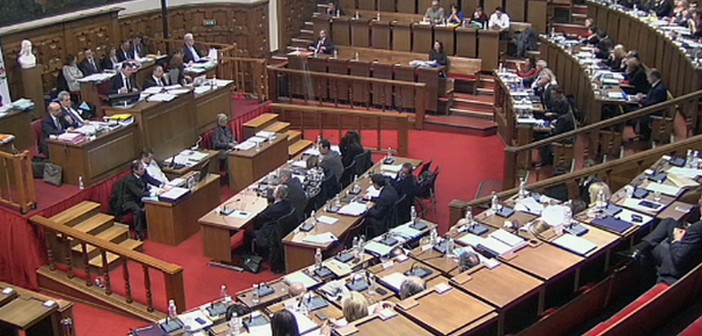It smelled like summer during this last session of the Metropolitan Council before the holidays.
A President, who already had his mind evidently turned towards another horizon, and who, contrary to his habit, left the scene to his number 2s, limiting himself to dotting a few i’s.
A tripartite opposition (Independents, eco-socialists, FN… the Bettati group being discreet and silent) limited themselves to playing their role (what else should they do but oppose?) by criticizing the deliberations and then abstaining or voting against them when it was time to express their stance.
As always, the highlight was the financial situation of the 2014 administrative account: is the metropolis too indebted or not? The question regularly arises and finds no conclusion, the dilemma remains in its caricatural expression: are we looking at the finger or the moon?
The opponents say the debt is increasing dangerously: indeed, it stands at 1,038 million by the end of 2014 for revenues of 1,150 million.
This means that the self-financing margins are shrinking (to 93 million at the end of the fiscal year) resulting in a decrease in investments, unless we resort to more loans to finance them, or increase household and business taxes, which Christian Estrosi ruled out at the start of his mandate.
The spiral can become dangerous if these investments do not provide, in reasonable time, a return that allows the loan to be repaid (and reduce or bring the debt down to zero).
It’s a classic maneuver that can only have one possible outcome: it must succeed! Namely, the investments must have a certain economic return. It’s the bet of Christian Estrosi and his team in these times of economic crisis: replacing failing private investments with public action.
Consequently, the question is simple: will the Operation Plain of Var in its entirety and with its annexes (the east-west tram line, the multimodal hub, and the congress center) be the lever for future tax revenues?
Beyond the numbers, which everyone can interpret at will, “that’s the question”!
Thus, one can sound the alarm (as Guillaume Aral did), one can go further (“you are the father of the debt” as Patrick Allemand stated), one can stigmatize as Marie-Christine Arnautu did, one can dodge by invoking the repayment capacity of 11.17 years well below the 15 years granted by the Regional Chamber of Accounts as Christian Estrosi replied, but ultimately, we stick to the basic rule: an investment must have a return. No need to beat around the bush.
Therefore, common sense leads us to the declaration by the president of the finance committee Philippe Pradal: “the debt increases due to investments and I assume it”.
On the menu, in addition to this main issue, dessert offered the variation of the PLU of the communes of Gillette and Levens, which allowed us to attend the beautiful (but sterile) plea of the ecologist Decoupigny and the passionate replies from the elected officials of the two municipalities whose qualities and skills are too often underestimated due to a lack of knowledge.
Finally, an incisive action was deliberated in favor of accommodation in the middle and high country to promote itinerant tourism to support its spread and development. The establishments concerned and eligible for partial funding of improvement investments are refuges, stopover lodges, camping and caravan sites, and rural and family hotels.
22 routes and 17 secondary loops have been validated to receive aid that can cover from 20% to 80% of the investment according to a very articulated scheme by type of intervention.
Finally, the tariff modality of parking lots (20 in outsourced management across three communes, Nice, Cagnes-sur-Mer, and Vence) will be modified to apply the Hamon law: no more payment by the hour or fraction of an hour but by the quarter hour, thus by 15-minute fractions.
The purpose of this provision is to make users pay for the consumption of the service.
Considering the hour allowance (which remains in force), 1h10 of parking will be counted as 1h15, no longer 2h.
And with that, happy holidays.


